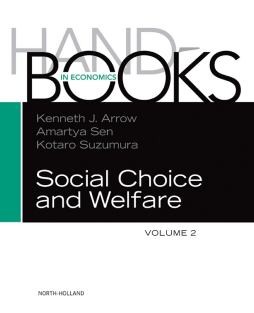
Additional Information
Book Details
Abstract
This second part of a two-volume set continues to describe economists' efforts to quantify the social decisions people necessarily make and the philosophies that those choices define. Contributors draw on lessons from philosophy, history, and other disciplines, but they ultimately use editor Kenneth Arrow's seminal work on social choice as a jumping-off point for discussing ways to incentivize, punish, and distribute goods.
- Develops many subjects from Volume 1 (2002) while introducing new themes in welfare economics and social choice theory
- Features four sections: Foundations, Developments of the Basic Arrovian Schemes, Fairness and Rights, and Voting and Manipulation
- Appeals to readers who seek introductions to writings on human well-being and collective decision-making
- Presents a spectrum of material, from initial insights and basic functions to important variations on basic schemes
"This volume continues the strong tradition of volume I (2002), supplementing it with foundational material and new results on Arrovian social choice. It also includes new material on fairness, rights, and manipulation, making the two volumes a masterful presentation of all the important topics in the field by its leading experts, including three Nobel laureates." --Steven Brams, New York University
"This much awaited volume provides authoritative surveys of some of the most important aspects of the theory of social choice and welfare economics. It will be a highly valuable resource for scholars interested in this area." --Prasanta K. Pattanaik, University of California, Riverside
"Social choice theory has produced some of the most powerful (and beautiful) findings in theoretical social science. This long-awaited volume will be a valuable resource to both students and scholars interested in exploring this important field." --Eric Maskin, Nobel Laureate in Economics
